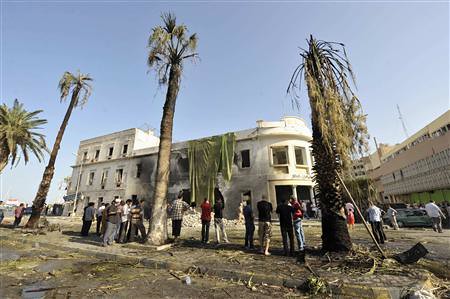
An explosion at the rebel defense ministry in Benghazi, Libya. The incident coincided with the first anniversary of the attacks on the US Consulate., a photo by Pan-African News Wire File Photos on Flickr.
A year after Benghazi attack, killings continue
Published: November 27
BENGHAZI, Libya — It is exceedingly easy to get away with murder here.
Just ask any Libyan: Who killed more than 50 police officers, soldiers and judges here and in the eastern city of Darna this year?
Who lit the fire that claimed the lives of U.S. Ambassador J. Christopher Stevens and another American at the U.S. diplomatic mission here just over a year ago? Who launched the mortar rounds that killed two CIA contractors that same night?
Or, for that matter, who bears responsibility for the 2011 torture and killing of Abdul Fattah Younis, the Gaddafi-era military commander who defected to lead the rebels?
“Do you live on Mars?” asked Hashem Bishr, the hard-line Salafist leader of a powerful Tripoli militia.
To understand Libya’s unsolved murder mysteries, understand this, Bishr said: “It’s just not a good time.”
What he meant is that there are people who know the answers — they’re just not willing to share.
Nor is the fragile, Washington-backed counter-revolutionary government prepared to mete out justice, many Libyans and rights groups say.
Tripoli’s weak authorities have promised to investigate the killings. “But until now, there is nobody in detention. Nobody has been charged. And according to our knowledge, no one is being investigated,” said Hanan Salah, a Libya researcher for Human Rights Watch. The government, she said, lacks the technical capacity to do so.
But there is also a powerful element of fear.
More than a year after the deadly attack on the U.S. mission here, the dilapidated port city that was the birthplace of Libya’s 2011 CIA-Pentagon-NATO engineered counter-revolution has become the epicenter of a shadowy campaign of assassinations and bombings. Most of the killings have targeted police and army personnel, along with a handful of judges and a political activist.
“The pale truth is that this is a bleeding city — a city that has a lot of losses every day,” said Fathallah Bin Ali, a Benghazi businessman who allies himself with the federalists, a faction in eastern Libya that is holding the region’s oil infrastructure hostage to extract more control from the government.
In recent months, mysterious early morning bombings have targeted two courts, a wedding hall and a popular cafe. No one was killed. But the intent, residents say, was intimidation.
Mohamed al-Bargathi said he has no desire to mend the facade of his once-bustling cafe, the Rotana, which was shattered last month by a homemade bomb in a bag left on the front steps.
“I’m afraid they’ll just bomb it again,” he said, smoking a cigarette outside the shuttered business. “If we knew who did it, we would kill him and reopen. But we don’t know who did it.”
Many here say that Benghazi is a microcosm of Libya’s larger struggles.
On a normal afternoon, political opponents and rival militia leaders can be seen warily eyeing one another over espressos from across hotel lobbies. The Libyan rebel special forces, resurrected from a force that existed before the counter-revolution, man camouflaged gun-trucks at intersections in the center of town and participate in a “joint-security operations room” to manage the city’s security. But their Islamist militia rivals have their own security operations room — their own bases and, sometimes, their own checkpoints.
This week, the special forces clashed with Ansar al-Sharia, the hard-line militia that remains the prime but unprosecuted suspect in the U.S. mission attack. Ansar was operating a roadside checkpoint at the city’s western edge.
Two weeks earlier, someone had fired a rocket-propelled grenade at the car of the Libyan operations room chief, killing his driver.
Depending on whom you ask, just about every armed group around here is guilty of killings, theft and human rights abuses.
Since Stevens’s death, U.S. officials, along with many other Western diplomats and civil society groups, no longer venture to Benghazi because the risks are simply too high. Even the FBI officials charged with investigating the Sept. 11, 2012, attack have conducted the bulk of their research from the safer confines of Tripoli, 400 miles away.
But Benghazi is wasting away, abandoned by its friends and investors at a time when it is most desperately in need of help — with justice, policing, reconstruction and employment opportunities — said Amina Megheirbi, a member of Libya’s elected congress who represents the city.
“It’s suffering from the evacuation — of our own government and all international missions,” Megheirbi said. “It left Benghazi open to extremists, criminals and Gaddafi supporters.”
The result, she said, is even more unemployed youths, more fuel for the fire. “One thing leads to another,” she said. “It worsens the situation.”
And so there are some Benghazi residents who take a different approach, looking a visitor in the eye and pleading: It’s not so bad. Tell the foreigners to come back.
“Benghazi is safe,” said Abdel Hafidh Sallak, a longtime political activist, sitting in his living room.
Sallak and others point to Venezia Street — a crowded boulevard just a few blocks from the charred wreckage of the U.S. mission where locals browse an array of gleaming, new clothes and furniture shops late into the night.
The U.S. ambassador’s death was an accident, Sallak insisted, adding that ordinary people haven’t been affected by the killings. In Libya, he said, “they never put the bombs in places where there are people.’’
No comments:
Post a Comment